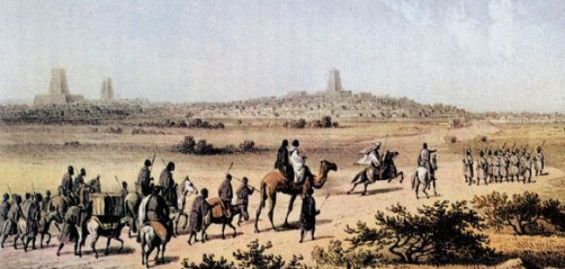Saadi sultan Ahmad al-Mansur was determined to maintain good alliances with the Christian economies. To achieve that, he preferred to head south, conquering sub-Saharan Africa and profiting from the trans-Saharan gold trade.
Ahmad al-Mansur’s big plans to solve Morocco’s economic deficit with Europe were executed by one man. His name is Judar, a military chief who led a small army to West Africa, in a campaign the sultan gave his blessing to.
Born as Diego de Guevara, Judar was of Spanish descent, a slave that was captured and enrolled into the sultan’s services as a little boy. In 1590, he was chosen by al-Mansur to conquer the Songhai Empire, one of the most powerful and largest African empires that was during the same year torn by a civil strife.
Conquering the Songhai empire
The Saadi sultan and Judar seized the opportunity to benefit from the Sahel empire’s resources, including gold, salt, leather, kola nuts and ivory. Studying Judar’s conquer of Mali, Ghanaian historian John Coleman De Graft Johnson wrote in his book «African Glory : The Story of Vanished Negro Civilization» (Black Classic Press, 1986) that «on February 28, 1591, Judar Pasha, halted his army on the left bank of the River Niger at an obscure village called Karabara».
 The Songhai army./Ph. DR
The Songhai army./Ph. DR
Judar and his invading army stayed for a short time in the village before moving toward Gao, the capital of Songhai to capture the source of gold. «Fifty miles from Gao, a quickly raised Songhai army of 18,000 cavalrymen and 9,700 infantrymen, led by Askia Ishak II, prepared to give battle», recalled Johnson.
The Songhai army, fortunately, had limited equipment, if not no guns at all. On the other hand, Judar’s men were «well supplied with firearms, including cannons», stressed the same book. The battle which was took place in April, was called the Tondibi battle. Although outnumbered by the Songhai, Judar managed to emerge victorious.
«The two armies approached each other (…) after his first and successful encounter with Songhai forces, Judar Pasha made his way to Gao unopposed».
Judar took control of the city and advanced toward Timbuktu and Djenné, controlling trans-Saharan trade routes, as planned by the Saadi sultan. However, the Spanish Pasha had to suffer the consequences of such a campaign.
Back to Marrakech
According to the Ghanaian historian, «Judar Pasha’s forces were being smitten by tropical diseases, and for a time he seriously considered coming to terms with Ishak, in fact he sent to the Sultan al-Mansur for the necessary authority to conclude a peace treaty». Moreover, more than 400 of Judar Pasha’s men died of disease.
Several historical sources suggest that Judar quickly changed his mind, deciding to stay in the Sahel. However, at the time, Ahmad al-Mansur had a different plan. «The Sultan looked round for a leader of grater enterprise and vigor than Judar Pasha», wrote John Coleman De Graft Johnson.

Al-Mansur was thinking of someone who would wrest from the Songhai people their stores of gold, especially as Judar encountered permanent battles with them. The sultan appointed Mahmud ben Zergun to replace Judar but the latter resisted the idea and kept procrastinating.
«He was unimpressed with the selection, writing back that a man of military experience was needed», recalled American writer Comer Plummer III in his book «Conquistadors of the Red City: The Moroccan Conquest of the Songhay Empire» (Lulu.com, 2018).
As a response, «the exasperated sultan sent him Ammar Pasha and told Judar to return ‘even if the land were in flames’», wrote Plummer.
Left with no other choice, by spring of 1599 Judar decided to leave the Sahel, he conquered nearly eight years before. «On March 27, Judar departed to Marrakech», leaving behind a tumultuous mess.
Another Pasha replaced Judar as he reached Marrakech where he was assassinated eight years later, on the orders of Moulay Abdallah, a member of the Saadi royal family.
Thanks to Judar Pasha, al-Mansur was able to gain the appellation «Mansur Eddahbi» (the golden emperor), allowing him to control the Sahel’s rich trade route.





 chargement...
chargement...













